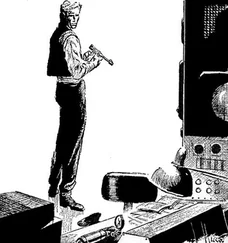Harry Harrison - The Turing Option
Здесь есть возможность читать онлайн «Harry Harrison - The Turing Option» весь текст электронной книги совершенно бесплатно (целиком полную версию без сокращений). В некоторых случаях можно слушать аудио, скачать через торрент в формате fb2 и присутствует краткое содержание. Год выпуска: 1992, ISBN: 1992, Издательство: Viking, Жанр: Фантастика и фэнтези, на английском языке. Описание произведения, (предисловие) а так же отзывы посетителей доступны на портале библиотеки ЛибКат.
- Название:The Turing Option
- Автор:
- Издательство:Viking
- Жанр:
- Год:1992
- ISBN:978-0-670-84528-6
- Рейтинг книги:3 / 5. Голосов: 1
-
Избранное:Добавить в избранное
- Отзывы:
-
Ваша оценка:
- 60
- 1
- 2
- 3
- 4
- 5
The Turing Option: краткое содержание, описание и аннотация
Предлагаем к чтению аннотацию, описание, краткое содержание или предисловие (зависит от того, что написал сам автор книги «The Turing Option»). Если вы не нашли необходимую информацию о книге — напишите в комментариях, мы постараемся отыскать её.
The Turing Option — читать онлайн бесплатно полную книгу (весь текст) целиком
Ниже представлен текст книги, разбитый по страницам. Система сохранения места последней прочитанной страницы, позволяет с удобством читать онлайн бесплатно книгу «The Turing Option», без необходимости каждый раз заново искать на чём Вы остановились. Поставьте закладку, и сможете в любой момент перейти на страницу, на которой закончили чтение.
Интервал:
Закладка:
“How old are you, Brian?”
“Hurts,” he muttered, rolling his head on the pillow, eyes closed. She sighed. It was not going to be easy.
As often as she dared she tried the question. There were good days and bad — mostly bad. Time passed and she was beginning to despair. Brian’s body was healing, but the mind-body link was still a fragile one. Hopefully, still hopefully, she asked the question again.
“How old are you, Brian?”
He opened his eyes, looked at her, frowned. “You asked me that before — I remember…”
“That is very good. Do you think you can answer the question now?”
“I don’t know. I know you have asked me that before.”
“I have. It is very smart of you to remember that.”
“It’s my head — isn’t it? Something has happened to my head.”
“That is perfectly correct. Your head has been hurt. It is much better now.”
“I think with my head.”
“Correct again. You are getting much better, Brian.”
“I’m not thinking right. And my back, my arm. They hurt. My head — ?”
“That’s right. You have had head injuries, your back and arm were injured as well — but they are mending very well. But your head injuries were not good, which will give you some confusing memories. Don’t let that worry you because it will come right in time. I am here to help you. So when I ask you a question you must help me. Try to answer — as well as you can. Now — do you remember how old you were at your last birthday?”
There had been a party, candles on the cake. How many of them? He closed his eyes, saw the table, the candles.
“Birthday party. Cake — a pink cake.”
“With candles?”
“Plenty candles.”
“Can you count them, Brian? Try to count the candles.”
His lips moved, his eyes still closed, working at the memory, stirring in the bed with effort.
“Lit. Burning. I can see them. One, two — more of them. All together, I think, yes, there are fourteen.”
The gray-haired woman smiled, reached out and patted him on the shoulder. Smiled down at him when his eyes fluttered open and he looked at her.
“That is good, very, very good, Brian. I am Dr. Snaresbrook. I have been taking care of you since the accident. So you can believe me when I say that your situation is greatly improved — and will improve steadily now. I will tell you about that later. I want you to sleep now—”
It wasn’t easy. At times it seemed to be two steps backward for every one ahead. The pain appeared to be lessening but it still bothered him; at times that was all he wanted to talk about. He had little appetite, but wanted the intravenous drip removed. For one day he just sobbed with fear; about what, she never discovered.
Yet, bit by bit, with dogged insistence, she helped the boy put his memories together. Slowly the tangled and cut skeins of his past were gathered up, rejoined. There were still large sections of memory missing. She was aware of that even if he wasn’t. After all — how can one miss something one does not remember? The personality of Brian was slowly and surely emerging, stronger each day. Until one day he asked:
“My father — Dolly, are they all right? I haven’t seen them. It has been a long time.”
The surgeon had been expecting the question, had prepared a carefully worded answer.
“When you were wounded there were other casualties — but none of them were people you know. Now the best thing for you to do is get some rest.” She nodded to a nurse and out of the corner of his eye Brian could see her inject something into the drip that led to his arm. He wanted to talk, ask more questions, tried to move his lips but plunged down into darkness instead.
When Dr. Snaresbrook next visited Brian she was accompanied by her neurosurgical resident, Richard Foster, who had closely followed the Delaney case.
“I’ve never seen so much recovery from such a grave injury.” Foster said. “Unprecedented. This kind of gross brain damage always leads to major deficiencies. Serious muscle weaknesses and paralyses. Massive sensory deficits. Yet all of his systems seem to be operating. It’s amazing that he’s recovered any mental function at all, with such an extensive injury. Normally such a patient would be permanently comatose. He ought to be a vegetable.”
“I think you’re using the wrong concept,” Snaresbrook explained patiently. “Brian has not, in fact, ‘recovered’ in the usual sense of the word. No natural healing process has repaired those connections of his. The only reason that his brain acts like more than a bunch of disconnected fragments is that we have provided all those substitute connections.”
“I understand that. But I can’t believe that we got enough of them right.”
“I suspect you’re completely correct about that. We were only able to approximate. So now, when an agent in one part of his brain sends a signal to some other place — for example, to move the arm and hand — that signal may not be precisely the same as it was before his injury. However, if we got things nearly right, then at least some of those signals will arrive in the right general area, somewhere they can have roughly the right effect. And that is the important thing. Give the brain just half a chance, and it will do the rest for you. The same as in any surgery. All the surgeon can do is approximate. One can never restore exactly what was there before — but that usually doesn’t matter that much because of how much the body can do.”
She looked at the monitors: blood pressure, temperature, respiration, carbon dioxide — and most important of all, the brain wave scan. The characteristic patterns of normal, deep sleep. Without realizing it she let out a deep breath. There were real and positive results now. Everything she had seen in the past weeks that suggested that her unorthodox, new, unproven plan might work after all.
Benicoff was waiting in the room outside, started to stand and Erin waved him back, sat down slowly in the armchair across from him.
“I’ve done it!” she said. “The words bubbled out, finally released. “When you saw him last — it was a very early stage. I have been working with him, helping him to access those memories and thoughts that are the periphery of his mind. He is still confused about a lot of things of course, has to be. But he speaks well now, has told me his age, that he is fourteen years old. And now he is asking about his father and stepmother. Do you realize what that means?”
“Very much so — and I’m happy to be the first to congratulate you. You have taken what was essentially a dead man with a dead brain — and have restored enough of his earlier memories to bring him to a mental age of fourteen.”
“Not really. Much of that is illusory. It certainly is true that Brian has now recovered many of his own memories of himself up to the age of fourteen. But very far from all of them. Some parts are missing, will remain missing, leaving gaps in his memory that may interfere with a lot of his abilities and attitudes. Furthermore, the age of that cutoff is far from sharp. A lot of threads that we’ve repaired do not go all the way up to that date — while others go well past that time. But the important thing is that we’re starting to see signs of a reasonably well integrated personality. Not a very complete one yet — but one that is learning all of the time. Much of the original Brian has returned — but in my opinion not yet enough.”
She was frowning as she said it, then forced a smile.
“In any case, none of that need concern us now. The important thing is that now we can enlist his active, thinking cooperation. And that means that we can proceed to the next stage.”
“Which is — ?”
Читать дальшеИнтервал:
Закладка:
Похожие книги на «The Turing Option»
Представляем Вашему вниманию похожие книги на «The Turing Option» списком для выбора. Мы отобрали схожую по названию и смыслу литературу в надежде предоставить читателям больше вариантов отыскать новые, интересные, ещё непрочитанные произведения.
Обсуждение, отзывы о книге «The Turing Option» и просто собственные мнения читателей. Оставьте ваши комментарии, напишите, что Вы думаете о произведении, его смысле или главных героях. Укажите что конкретно понравилось, а что нет, и почему Вы так считаете.










